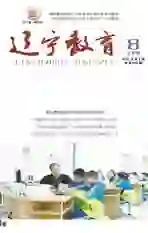基于语篇理解 感悟生命内涵
2021-08-30张敬峰
张敬峰
《普通高中英语课程标准(2017版)》提出:学科核心素养是学科育人价值的集中体现,是学生通过学科学习而逐步形成的正確价值观念、必备品格和关键能力。英语学科核心素养主要包括语言能力、文化意识、思维品质和学习能力。义务教育阶段的英语课程具有工具性和人文性双重性质。就人文性而言,英语课程承担着提高学生综合人文素养的任务,即学生通过英语课程能够开阔视野,丰富生活经历,形成跨文化意识,增强爱国主义精神,发展创新能力,形成良好的品格和正确的人生观与价值观。
外研版小学新标准英语六年级下册第七模块第二单元中的She couldnt see or hear.是一篇人文性很强的课文。本课用过去时态完整讲述美国盲聋女作家Helen Keller的生活、学习及成名经历,使学生提升语言素养的同时,提升学科核心素养。本课的德育元素大于知识元素,重点是让学生能在实际情境中运用目标语句:She couldnt see or hear. She learnt to read, write and speak. She is a model for blind people.难点是灵活、清晰、流畅地使用could,couldnt及常见动词过去式描述人物具备和不具备的能力。
【学情分析】
学生在六年级下学期已经积累了600个词汇和200个句式,掌握一般现在时、一般将来时、现在进行时和一般过去时的基本用法,80%的学生养成了良好的语言学习习惯,具备较强的综合语言运用能力。在本课学习过程中,学生可能遇到illness, learnt, travelled, model等词汇的发音障碍,教师需反复强化;在复述课文或灵活表达环节,学生可能出现不流利的情况,教师应及时提供词汇线索,助其完整表达。
【思路梳理】
基于高品质课堂实践的落脚点——立足于对学生生命的尊重与关怀的高度,弘扬“爱”的崇高,彰显“育人”的核心主题,坚持能力为重的鲜明主线,追求学生健康成长的终极目标。结合高品质课堂高尚、本真、丰厚、灵动的基本要素。本课我以话题做导引,在激趣创境中和学生一起经历粗读、精读到深挖文章内涵的过程;设计问题链,带领学生理解、朗读课文,提升语言能力;用特殊疑问词when, where, what, how, why组成思维导图,帮助学生灵活运用所学语言复述课文,提升思维品质;组织励志体验活动,让学生在参与中感悟生命的意义,珍惜今天的幸福生活。
【核心问题】
如何用过去时态完整讲述Helen Keller的故事。
【教学目标】
1.在情境中实践语言,谈论过去具备和不具备的能力。
2.在体验、组句竞赛中增强小组合作能力,提升思维品质和学习能力。
3.学习Helen Keller这位世界级盲聋女作家身残志坚的优秀品质,丰厚学生的文化积淀,以此激励自己不畏艰难,不言放弃。
【教学过程】
环节一
子问题:
Lets be familiar with Helen Keller.
问题情境1:
Who is Helen Keller?
解决策略:
1. Students and the teacher share hobbies with each other.
2. The teacher tells her hobby is reading and her favorite book is Three days to see written by Helen Keller.
3. Students read the electronic book about Helen Keller.
问题情境2:
When and where was Helen Keller born? What was Helen Keller like?
解决策略:
1. Students try to answer that Helen Keller was born in the US in 1880.
2. The teacher asks with the sentences,‘Could she see or hear? Why? Could she read, write or speak?
3. Students open books, read the story and try to answer the questions.
4. Students watch a video about Helen Keller, listen and imitate, then fill in the blanks with the words ‘born, illness, round, all over the world on PPT. The teacher explains and leads to read.
5. Students experience being blind and deaf by wearing eye masks and ear plugs, then share feelings.
环节二
子问题:
Helen Keller was disabled, but she had a strong belief. Lets know more and try to tell her story.
问题情境1:
When telling stories, we should use the past tenses of the verbs, lets practise.
解決策略:
1. Quick eyes. The teacher shows flash cards of the original verbs ‘can, have/has, learn, is, try, travel, tell, write, help quickly, students tell their past tenses ‘could, had, learned/learnt, was, tried, travelled, told, wrote, helped.
2. Students practise in pairs.
3. Students read the story with the talking pen.
问题情境2:
When telling stories, we should have the ability of logical thinking.
解决策略:
1.he teacher shows the questions ‘When was Helen Keller born? Where was she born? What happened to her? How did she feel? Did she stay in her country until the end of her life, why? with the slide show. At the same time, stick words ‘when, where, what, how, why on the blackboard to form a mind map.
2. Students read the story again, write the answers on the paper, then share with partners.
3. The teacher gave the answers with the slide show.
4. Game:Put the sentences in the right order.
Rules: Every student has a piece of paper with one sentence about the story, nine students work in one group, listen and put the sentences in the right order, the teacher awards the first three groups.
5. Group story reading competition.
问题情境3:
What a brilliant disabled woman Helen Keller was! Now lets try to retell her story with humble gratitude.
解决策略:
1. Students come to the front and retell the story with the clues of the mind maps on the blackboard.
2. Students stand up and sing ‘When I was a baby for relaxation.
环节三
子问题:
Lets be familiar with a disabled man, Nick Vujicic.
问题情境:
Do you know Nick Vujicic? He has no arms, no legs, but he is living a happy life. Lets go with him.
解决策略:
1. Students watch a video about Nick.
2. Students talk about Nick.
3. Students do some reading comprehension.
环节四
子问题:
Reading and retelling can help us understand, while writing can help us digest and use what weve learned.
问题情境:
Its writing time. Please write a story about Helen or Nick with the past tenses of the verbs.
解决策略:
1. Students write a story about Helenor Nick. They can select some key words from the slide show.
2. Students share reading, the teacher gives feedback about the contents and handwriting.
3. Students give examples of disabled people they know, the teacher introduces Tai Lihua and Stephen Hawking with the music of thankful heart.
4. The teacher summarizes that comparing with the people who are disabled, all of us are too lucky, so cherish every day, study harder and make better use of life.
【课后反思】
一是潜移默化,训练思维。本模块以语篇带动词句学习,课前我与学生共读《假如给我三天光明》,初识海伦·凯勒;课中与学生经历“句子归位”“故事复述”活动组句、说句活动,拓展学生的英语思维,使他们熟识海伦·凯勒。
二是创设语境,提升能力。基于学情和教学内容,本课我力求创设自然且有意义语境,通过填一填、写一写、说一说、读一读及问题链的形式帮助学生感知探索海伦·凯勒身残志坚的生命历程,借助思维导图鼓励學生复述文本、找寻阅读方法,提升语用能力。
三是聚焦个体,收获情感。我让学生戴眼罩耳塞模拟进入海伦·凯勒的世界、观看尼克·胡哲的励志视频,激发学生内在情感,培育其坚毅的道德品质和健康的身心状态。
【案例评析】
《义务教育英语课程标准(2011年版)》指出,语言具有丰富的文化内涵,在学习英语的过程中,让学生接触和了解英语国家的文化,有益于学生对英语的理解和使用,能提高学生对中外文化差异的敏感度和鉴别能力,进而提高跨文化交际能力。本课是一节基于语篇理解带动文化体验的英语课,课上师生同心携手经历了一段鲜活的生命历程和一场安静的文化之旅,整节课体现了教育立意的高尚、学生学习的本真、文化传播的丰厚和情感升华的灵动。
本课亮点有如下三点:一是彰显课程育人的文化价值,二是凸显教师的主导作用,三是凸显学生的主体地位。这是一节语言课,也是一次“漫长”的生命体验课,学生经历过程,体会滋味,产生感悟:无论处于何种人生境遇,拥有阳光的心态、坚定的信念和顽强的毅力都会成为再次成功的基石。
本课中,学生一边习得语言,一边感悟生命真谛,他们的心灵被高尚的情操悄悄地灌溉,他们的身心在珍惜和感恩中茁壮地成长。一堂课,一本书,一个人物,一种人生,一次体验,Helen Keller带给我们诸多对生命的珍视与思考:唯有活在当下,活好当下,不断超越自我,方可不负初心,勇敢前行。
(责任编辑:李晶)
